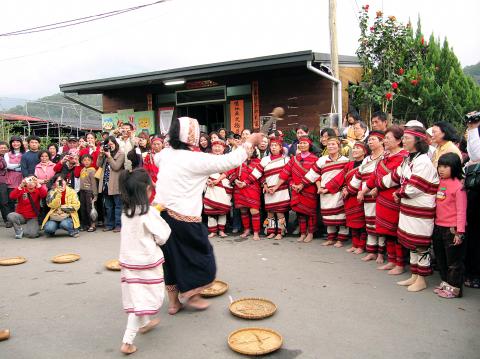The Kahabu people (also written as Kaxabu), one of the Pingpu Aboriginal tribes, will hold a festival in the Niumin (牛眠) community, on the outskirt of Puli Township (埔里), Nantou County, on Dec. 8. It will be an excellent opportunity for anyone interested in this group of Pingpu Aboriginals to learn something about their culture and traditional rituals.
“This event celebrates the New Year, according to our traditional lunar calendar,” said Aylian Hsiao (蕭愛蓮), secretary-general of the Kaxabu Culture and Education Association of Nantou County (南投縣噶哈巫文教協會), the festival’s main organizer.
“It is the most important festival for our Kahabu community. Family members return home to attend because it is full of joyful celebrations — with dance, music, entertainment and communal meals,” she told the Taipei Times.

Photo: Jason Pan, Taipei Times
Pingpu, or plains, refers to various Aboriginal groups living in lowland areas around the country that have adopted Han Chinese culture to different degrees, with many having lost their culture, language and ethnic identity.
Although they are also Aborigines, many Pingpu groups such as the Kahabu are not officially recognized as such because they didn’t register their ethnic identity in the 1950s.
“The festival is held so that we will not forget our history and our culture,” Hsiao said.
Hsiao said visitors are welcomed to join in, with events running from 10am to 9pm. In the morning, there will be guided tours of the community and the Kahabu Cultural Museum. The tours will also introduce the area’s newly-initiated agritourism projects.
The main events are in the afternoon, with traditional competitions of a short-marathon running race (走鏢), bow-and-arrow shooting and dexterity skill of splitting sugar cane with a traditional hunting knife.
The highlight is the traditional dance and music performance by Kahabu groups. Hsiao said this year’s roster of events include performances by other Pingpu groups: Pazeh, Tavorlong and Siraya.
The festival will culminate with a Kahavu Bonfire, where people will join hands and sing songs while walking around a large fire. The festival wraps up in the evening with a celebratory dinner with Kahabu community families.
“Everyone is welcomed to participate in the bonfire, the bigger the crowd to give better prospects for next year’s agricultural harvest,” Hsiao said.
Getting there:
Kuo-Kuang (國光客運) bus service departs from the Western Bus Terminal near Taipei Main Station, direct to Puli. A shuttle bus departs the Puli bus station on the hour, every hour from 7am to 3pm to the festival site.

April 14 to April 20 In March 1947, Sising Katadrepan urged the government to drop the “high mountain people” (高山族) designation for Indigenous Taiwanese and refer to them as “Taiwan people” (台灣族). He considered the term derogatory, arguing that it made them sound like animals. The Taiwan Provincial Government agreed to stop using the term, stating that Indigenous Taiwanese suffered all sorts of discrimination and oppression under the Japanese and were forced to live in the mountains as outsiders to society. Now, under the new regime, they would be seen as equals, thus they should be henceforth

Last week, the the National Immigration Agency (NIA) told the legislature that more than 10,000 naturalized Taiwanese citizens from the People’s Republic of China (PRC) risked having their citizenship revoked if they failed to provide proof that they had renounced their Chinese household registration within the next three months. Renunciation is required under the Act Governing Relations Between the People of the Taiwan Area and the Mainland Area (臺灣地區與大陸地區人民關係條例), as amended in 2004, though it was only a legal requirement after 2000. Prior to that, it had been only an administrative requirement since the Nationality Act (國籍法) was established in

Three big changes have transformed the landscape of Taiwan’s local patronage factions: Increasing Democratic Progressive Party (DPP) involvement, rising new factions and the Chinese Nationalist Party’s (KMT) significantly weakened control. GREEN FACTIONS It is said that “south of the Zhuoshui River (濁水溪), there is no blue-green divide,” meaning that from Yunlin County south there is no difference between KMT and DPP politicians. This is not always true, but there is more than a grain of truth to it. Traditionally, DPP factions are viewed as national entities, with their primary function to secure plum positions in the party and government. This is not unusual

US President Donald Trump’s bid to take back control of the Panama Canal has put his counterpart Jose Raul Mulino in a difficult position and revived fears in the Central American country that US military bases will return. After Trump vowed to reclaim the interoceanic waterway from Chinese influence, US Defense Secretary Pete Hegseth signed an agreement with the Mulino administration last week for the US to deploy troops in areas adjacent to the canal. For more than two decades, after handing over control of the strategically vital waterway to Panama in 1999 and dismantling the bases that protected it, Washington has